
20+ Blockchain Development Tools
Written by Alchemy
According to reports, blockchain development is among the fastest-growing sectors. With the explosion of projects built on blockchains (DeFi, NFTs, DAOs), demand for blockchain developers has skyrocketed.
When you are already building on the blockchain, or plan to create a free blockchain developer account with Alchemy, here is a comprehensive guide to some of the best tools for creating blockchain applications.
Let's dive in!
Programming languages
To develop blockchain applications, you need to learn a programming language. These languages allow you to create smart contract code that functions as the backend for your application.
Solidity
For now, Solidity is the most popular programming language for blockchain development. Solidity is a high-level, object-oriented language that borrows several elements from other languages, notably C++.
Many developers prefer to learn Solidity because Ethereum, considered the de facto blockchain, uses Solidity for writing smart contracts. Besides that, Solidity is Turing-complete, allowing you to create complex applications with rich functionality.
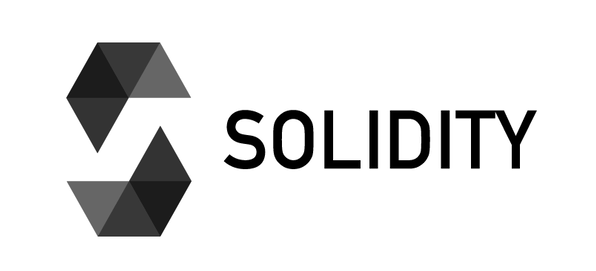
Learning Solidity is a great way to get started with your journey as a blockchain developer. Solidity's popularity means you can access useful tutorials, guides, and documentation designed to onboard beginners.
Solidity programs can also work on other blockchains, so long as they're compatible with the Ethereum Virtual Machine (EVM). This means you can deploy projects on EVM-compatible blockchains, such as Binance Smart Chain, Avalanche, Polygon, Matic Network, and more.
Vyper
Solidity is hardly the only language for creating smart contracts. A popular alternative is Vyper—a Python-based and EVM-compatible language.
While Vyper doesn't have as much functionality or popularity as Solidity, it can be ideal for developers familiar with Python. Moreover, Vyper's simple architecture reduces software errors and eases smart contract auditing.
Rust
Rust is a newer programming language that's gaining traction in the blockchain development community. It's a low-level language for writing smart contracts and is prized for its memory efficiency, simplicity, and reliability.
The catch is that Rust is non-EVM compatible, so you cannot deploy projects on Ethereum and EVM-compatible chains. But newer chains like Solana, Terra, NEAR, Polkadot, and Elrond use Rust, so learning this language is still a good investment.
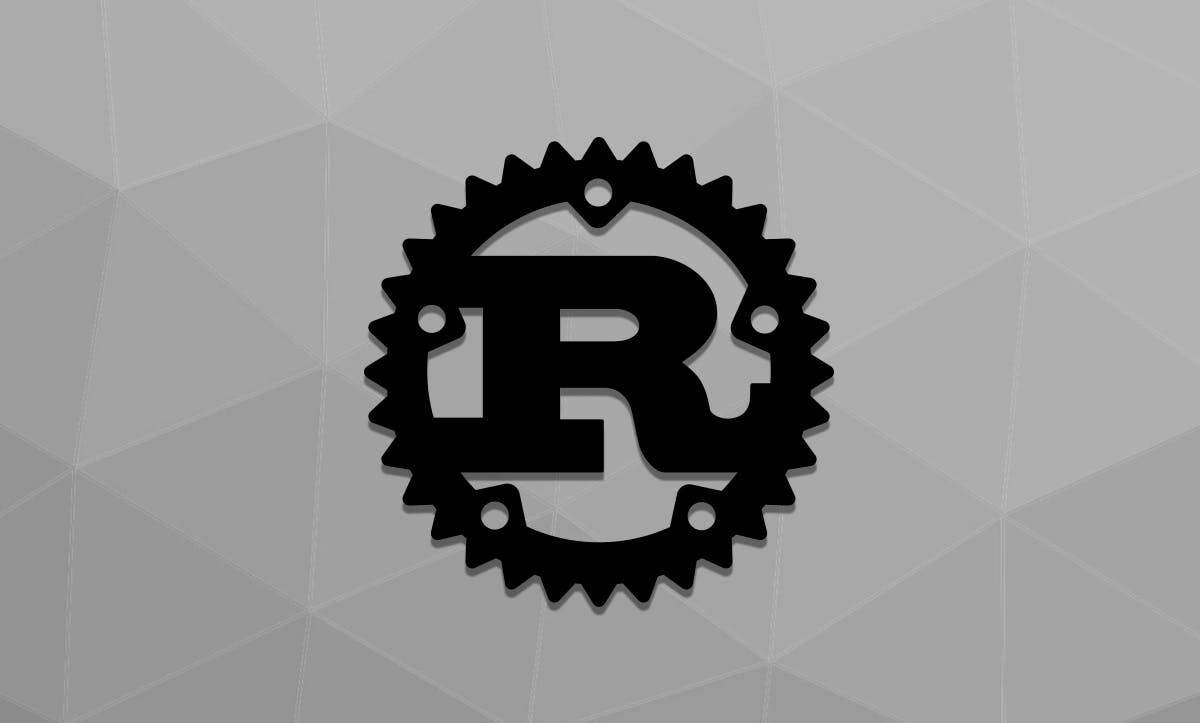
Frameworks
Building a decentralized application (dApp) from scratch can be a difficult task, especially if you have to handle every tiny detail yourself. Fortunately, you can benefit from software frameworks that provide plug-and-play infrastructure for creating dApps easily.
Frameworks come with resources (libraries and tools) useful for creating, testing, and deploying code. Coding your dApp from the ground up is unnecessary since you can take a ready-made package and add extra functionality. Besides, most frameworks are developed and optimized by experienced engineers, making them robust, efficient, and versatile.
Truffle
First on our list of blockchain development frameworks is Truffle. Truffle is a JavaScript-based framework for developing, testing, and deploying smart contracts. It’s remained one of the blockchain industry's most-used frameworks—and for good reason.
Truffle comes packed with resources you need to create a fully functional dApp, from built-in smart contract creation tools to test blockchain environments. It also comes out-of-the-box with libraries that make building your Ethereum dApp’s frontend easier.

Hardhat
Hardhat is another highly recommended framework for smart contract developers. Like Truffle, Hardhat is a JavaScript-based framework for creating, testing, deploying, and debugging applications on Ethereum.
Hardhat is a comprehensive tooling platform that abstracts away most low-level, generic functions associated with blockchain software development. Therefore, you can focus on more important tasks like building core infrastructure for your dApp.
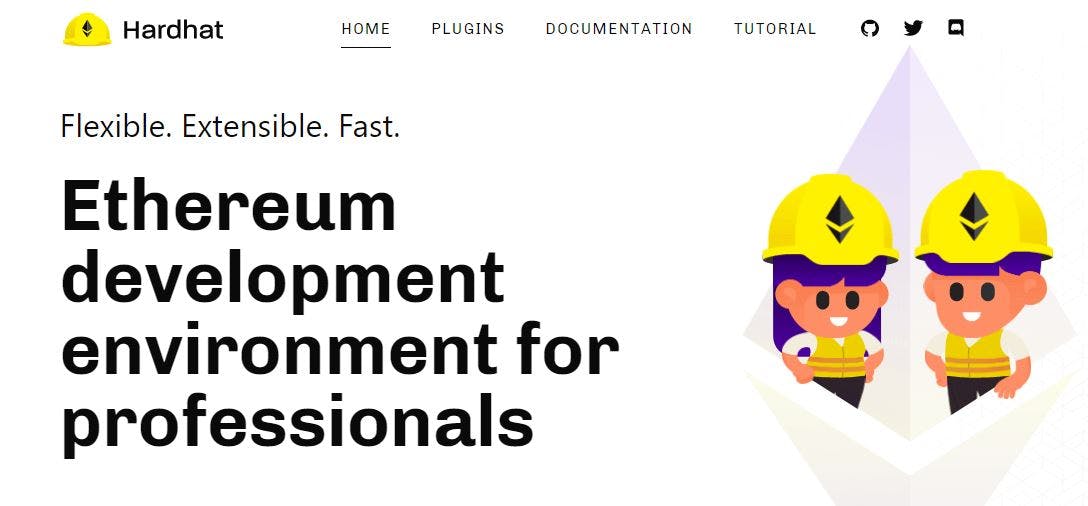
Embark
Embark is a full-stack development framework that allows you to build your dApp’s frontend and backend simultaneously. Although last on the list, Embark is just as good as the other frameworks listed in this section.
Embark offers resources for dApp data storage, real-time code testing, and smart contract deployment. Plus, you’ll get access to important plugins like Etherscan, Solc, Solium, and many more.
Integrated Development Environments (IDEs)
An Integrated Development Environment (IDE) aids application development by combining core developer tools into one Graphic User Interface (GUI). Most IDEs come with code compiling, editing, syntax highlighting, build automation, and debugging capabilities, among others.
Remix IDE
Remix is considered the industry standard for IDEs by many blockchain developers. With Remix IDE, you can compile, test, and debug smart contracts—all from one intuitive interface.
Remix IDE is written in JavaScript and you can use it from any browser, although you can also run it locally on your computer (as a desktop application). It offers a comprehensive suite of libraries, plugins, and other features to supercharge smart contract development.

EthFiddle
EthFiddle is a browser-based IDE for writing and debugging Solidity code. Developed by the Loom Network, EthFiddle is an excellent tool if you're collaborating with others on a project. With this software, you can easily edit, find, and share code snippets with others for feedback.
EthFiddle isn't as feature-rich as Remix IDE, but it's great for sharing code on a presentation. It offers well-designed testing and prototyping capabilities, making it a good tool for any blockchain developer.
Ethcode
We also recommend Ethcode, a Visual Studio Code plugin for Ethereum smart contract development. Ethcode offers a beginner-friendly development environment for writing, debugging, and unit testing contract code.
The code is open-source, and new developers can ask for support when needed. Ethcode works for both Vyper and Solidity and can deploy your smart contract to Ethereum Mainnet and Goerli testnet, among others.

APIs and SDKs
Besides frameworks and IDEs, APIs and SDKs are among the most important tools for Web3 developers. Both help blockchain engineers solve specific problems faced during development and aid dApp creation.
An Application Programming Interface (API) is designed to simplify the interaction between different software. You can build on existing functionality by using an API to request data to improve your dApp.
SDK is short for "Software Development Kit" and refers to a collection of software products for building applications for a particular platform. Blockchain development SDKs reduce the complexity of building platform-specific dApps.
Alchemy NFT API
With the value of non-fungible tokens (NFTs) skyrocketing, many developers are turning their attention toward this industry. If you plan to create an NFT app, Alchemy's NFT API is the perfect tool.
Alchemy NFT API lets developers display metadata for different NFTs in a user-friendly interface. And it works across multiple chains (Ethereum, Polygon, Flow, etc.), so buyers have greater flexibility in choosing NFTs.
The NFT API abstracts away most technical tasks involved in interacting with NFTs. With the NFT API integrated into your platform, buyers don’t have to read smart contracts before verifying and buying NFTs.
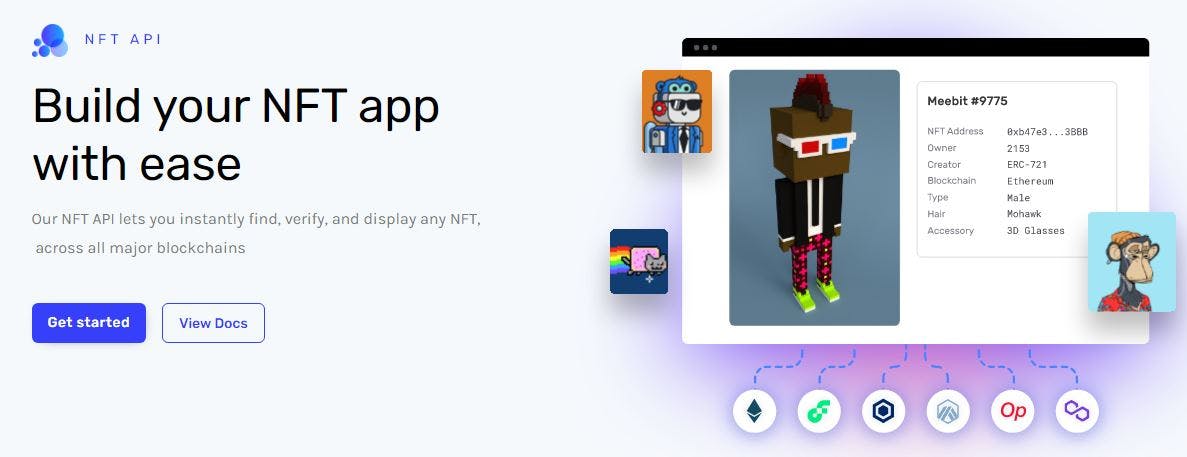
Thirdweb SDK
The Thirdweb SDK is useful for building Web3 apps or integrating Web3 features into an existing application. For example, you can add a "Connect Wallet" feature to your application without needing to write code.
Thirdweb can be used for the following:
Creating NFT marketplaces
Launching NFT drops without writing code
Creating tokens for governance, community membership, and other purposes
Programming royalty splits into NFTs
Thirdweb currently supports Fantom, Avalanche, Ethereum, and Polygon—and promises support for more chains in the future. While smart contracts are free to use, Thirdweb makes money by charging a 5% fee on future royalties earned from token contracts.
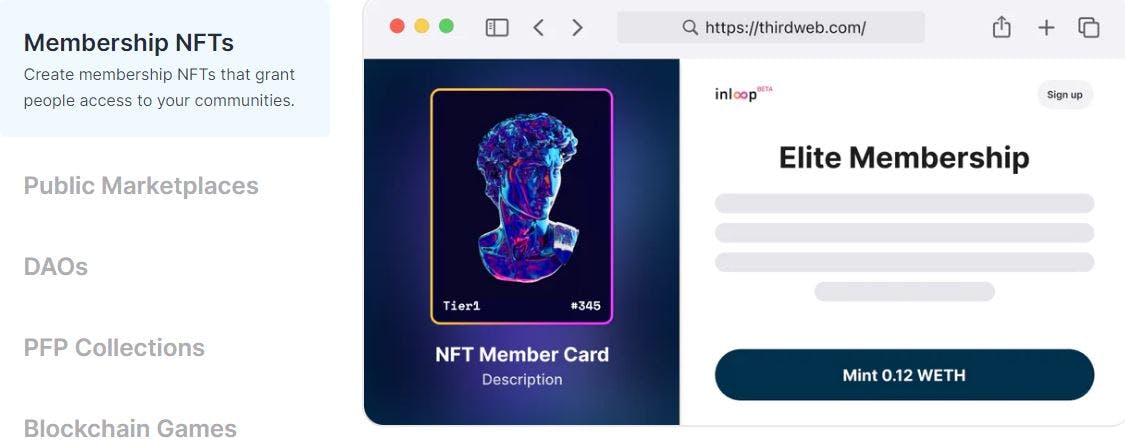
Moralis API and SDK
Moralis is a Web3 development platform with API and SDK offerings to speed the blockchain development cycle. The Moralis SDK reduces the complexity of building a fully functional dApp by providing ready-made functionality such as:
Authenticating users
Sending and fetching transactions
Listening to smart contract events
Pulling user balances
Interacting with smart contracts
Moralis' cross-chain Web3 API can also aggregate comprehensive information about account balances, tokens, on-chain transactions, and more. And it supports the most popular chains, including Avalanche, Polygon, Ethereum, and Binance Smart Chain.
Test blockchain networks
By default, most smart contracts are immutable, ruling out any modifications once the code is deployed on the blockchain. As such, testing on Ethereum Mainnet is discouraged since you cannot make changes post-deployment.
To combat this problem, Ethereum developers can use a test blockchain network (testnet) for testing dApps. A test network lets you see how your smart contract works on a blockchain, allowing you to find any flaws before launching it.
Local blockchain (Ganache)
Ganache is a local blockchain for Ethereum development and is available as a command-line tool or desktop application. Blockchain developers can use Ganache for deploying smart contracts and performing tests.
The Ganache tool boasts a user-friendly interface where you can access debugging information and blockchain data (accounts, blocks, transactions). You can also configure other elements, like block times, to suit your development needs.
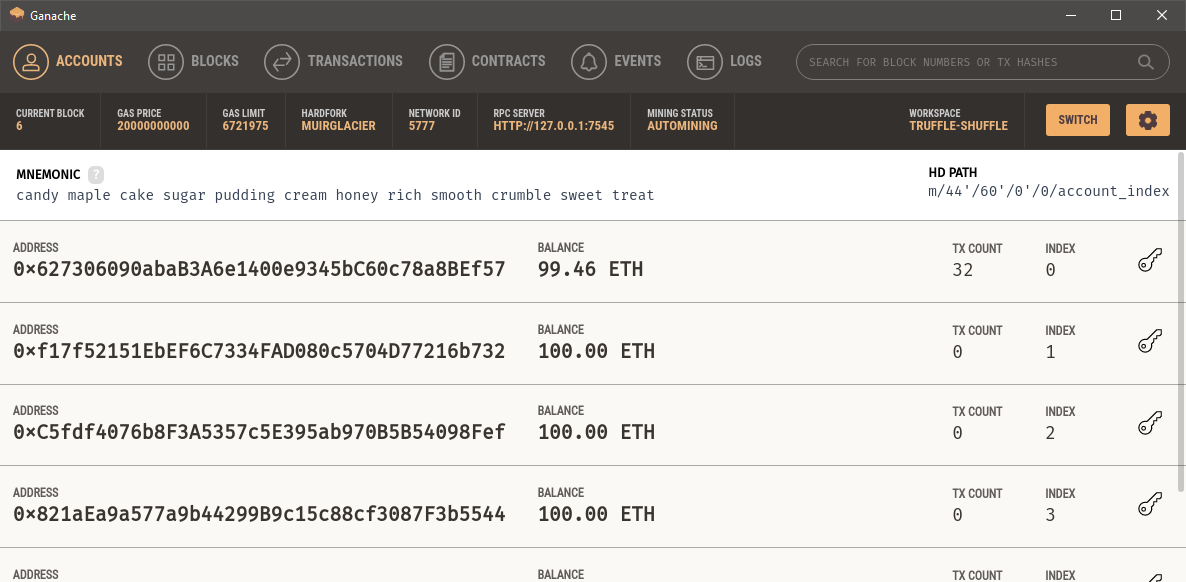
Public testnets (Goerli/Sepolia)
You can use a public testnet like Goerli, or in place of Ganache. The main difference is that Ganache can be used offline and doesn't require online access.
Some developers prefer public Testnets because they simulate Ethereum's behavior and may be better for testing assumptions.
While testnets are free to use, you'll need test ether (ETH) in your browser wallet to complete transactions. The easiest way to get test ether is by using a faucet, like the Alchemy Goerli Faucet.
Oracles
While smart contracts have exciting applications, their functionality is limited since they can only access information stored on-chain. This creates problems for any developer building a smart contract that relies on external information to execute functions.
This is where oracles come into the picture.
Blockchain oracles collect real-world information from different sources and pass it on to smart contracts running on the blockchain. This information can take many forms: live price feeds, weather information, sports results, and many more.
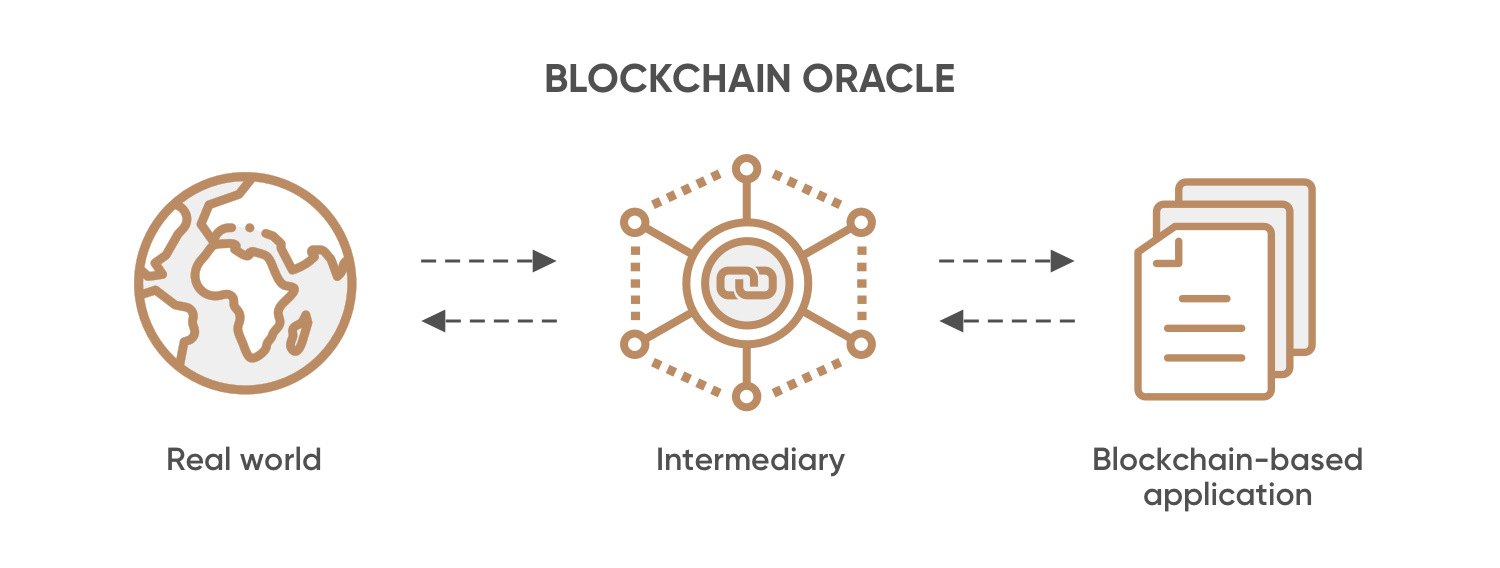
It's important to choose a decentralized oracle, as they are harder to manipulate by malicious actors and provide (mostly) reliable information. Many popular dApps like Kyber, Synthetix, and Compound use decentralized oracles to execute smart contracts.
Chainlink
Currently, Chainlink is the leading decentralized oracle solution by market share. Launched in 2017, Chainlink offers "reliable and tamper-proof" data for smart contracts across multiple blockchains.
With Chainlink, you can connect your smart contracts to an assortment of real-world data feeds. For example, you can create a betting dApp that rewards users for predicting outcomes of real-world events.
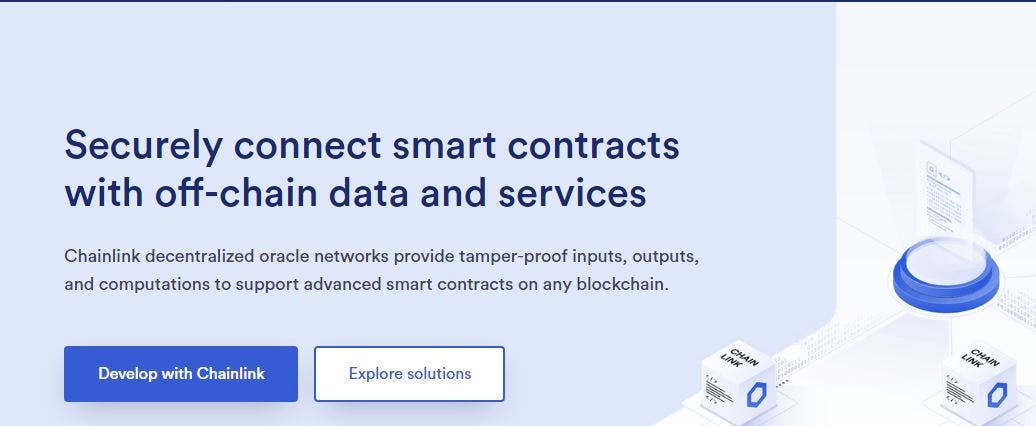
Other decentralized oracle solutions include Band Protocol, Witnet, and Universal Market Access (UMA). These applications incentivize selected oracles to provide accurate information, preserving the integrity of off-chain data.
Blockchain node providers
When building a dApp, you’ll need to interact with the blockchain—whether that’s reading on-chain data or writing data to the blockchain. To do that, connecting with a blockchain node is necessary; blockchain nodes hold the entire blockchain history and can send/query blockchain data.
The problem is that maintaining a full Ethereum node is expensive, time-intensive, and complex. For this reason, blockchain developers are advised to use a blockchain node provider (node-as-a-service). Node providers handle the blockchain infrastructure for clients, freeing you up to focus on building and scaling your dApp.
Alchemy Supernode
If you’re looking for a suitable blockchain node provider, Alchemy Supernode is worth trying. Supernode provides a fully developed suite of APIs for interacting with the blockchain and getting critical blockchain data.
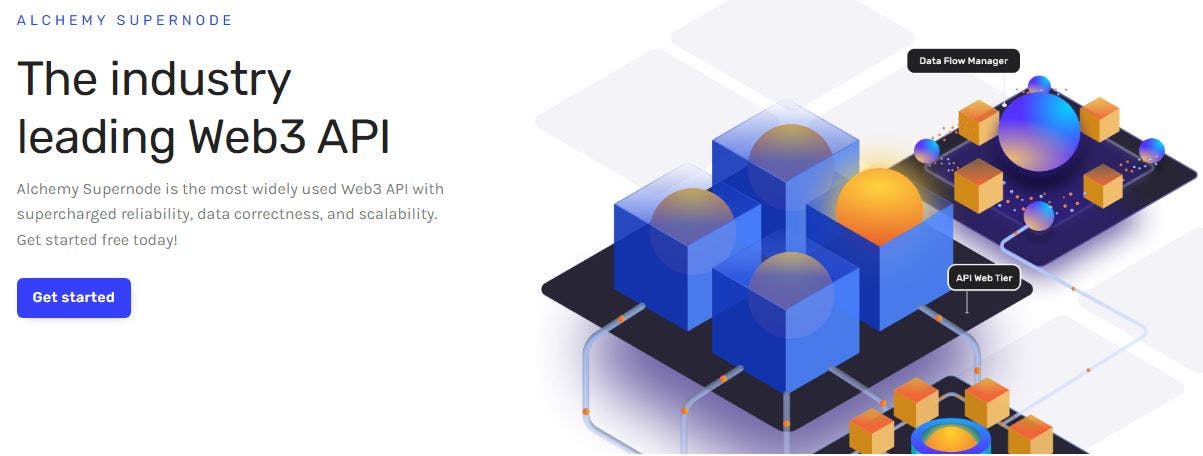
With our tool, connecting to the blockchain network layer is as simple as signing up and receiving an API key. This service works for other projects, not just Ethereum—so you have full flexibility in terms of blockchains to use.
Alchemy’s node-as-a-service tool also offers the following benefits:
1. Free sign-ups: Start using Supernode for free and upgrade to access special features.
2. Scale-as-you-go infrastructure: As your dApp scales in usage, it becomes difficult to run a dedicated node. You could try spinning up more nodes, but that just compounds the problem and increases your overhead.
Supernode is designed to adapt to your needs and provides seamless scalability. That way, you don’t lose sleep over node infrastructure, and your users can enjoy a better experience.
3. Enhanced APIs: Alchemy Supernode comes with a collection of unique API endpoints to make querying blockchain data easier than ever. Get transaction history, token identifiers, transaction receipts, pending transactions, and more.
4. Reliability: Standard nodes often run into various problems that cause dApps to crash. With Supernode, you get peak reliability, ensuring that your blockchain application can run without downtimes.
There are other node providers you can check out, if you want to have an idea of available options. Other names in this product category include QuickNode, Infura, GetBlock, BlockDaemon, and Chainstack.
Analytics
When building dApps, many Web3 developers soon find out that tracking on-chain activity is difficult. In most cases, you need to do heavy lifting before getting critical application information like real-time usage information, user adoption rates, and token metrics.
However, analyzing these data points is important if you want to improve your dApp and grow your user base. To this end, you want to use a tool like Alchemy Monitor which makes it easier to get analytics for your Web3 application.
Alchemy Monitor
Alchemy Monitor is a powerful, purpose-built tool for monitoring dApp infrastructure and gaining insights into user activity. Alchemy Monitor offers real-time updates on your dApp's health and can show API calls, error rates, and response times.
The Alchemy Monitor dashboard also tracks dApp usage and can provide useful insights into user behavior. And it has a nifty automated alert system to flag issues early before your dApp suffers critical malfunctions.
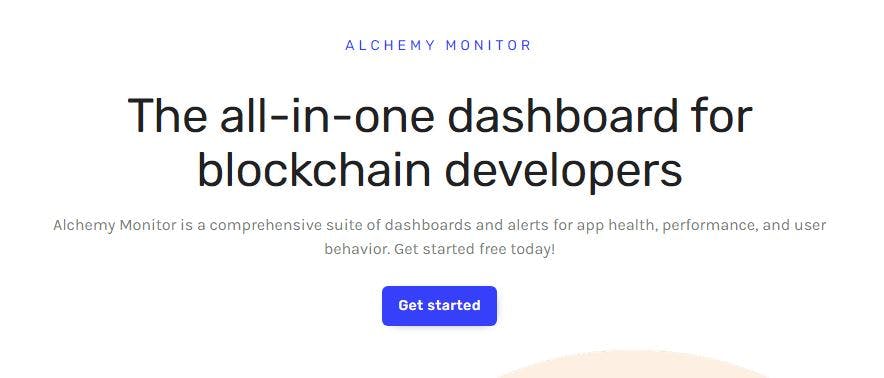
Alchemy Notify
Developers aren’t the only ones who need real-time information about dApp activity; users need to know what’s happening with the dApp, too. For instance, a user may want to know if a transaction executed within the dApp was successful.
This is why using the Alchemy Notify push notification service is an excellent idea. Adding push notifications to your dApp may be the difference between excellent and poor user experience. Notify provides application users with the following information:
Transaction notifications;
Address activity alerts;
Gas price alerts, and more.
When combined, Alchemy Monitor and Notify provide better analytics and allow developers to improve usability of blockchain applications. You may combine these tools with a blockchain explorer, like Etherscan, which supplies information about the Ethereum blockchain itself (average gas prices, block times, etc.).
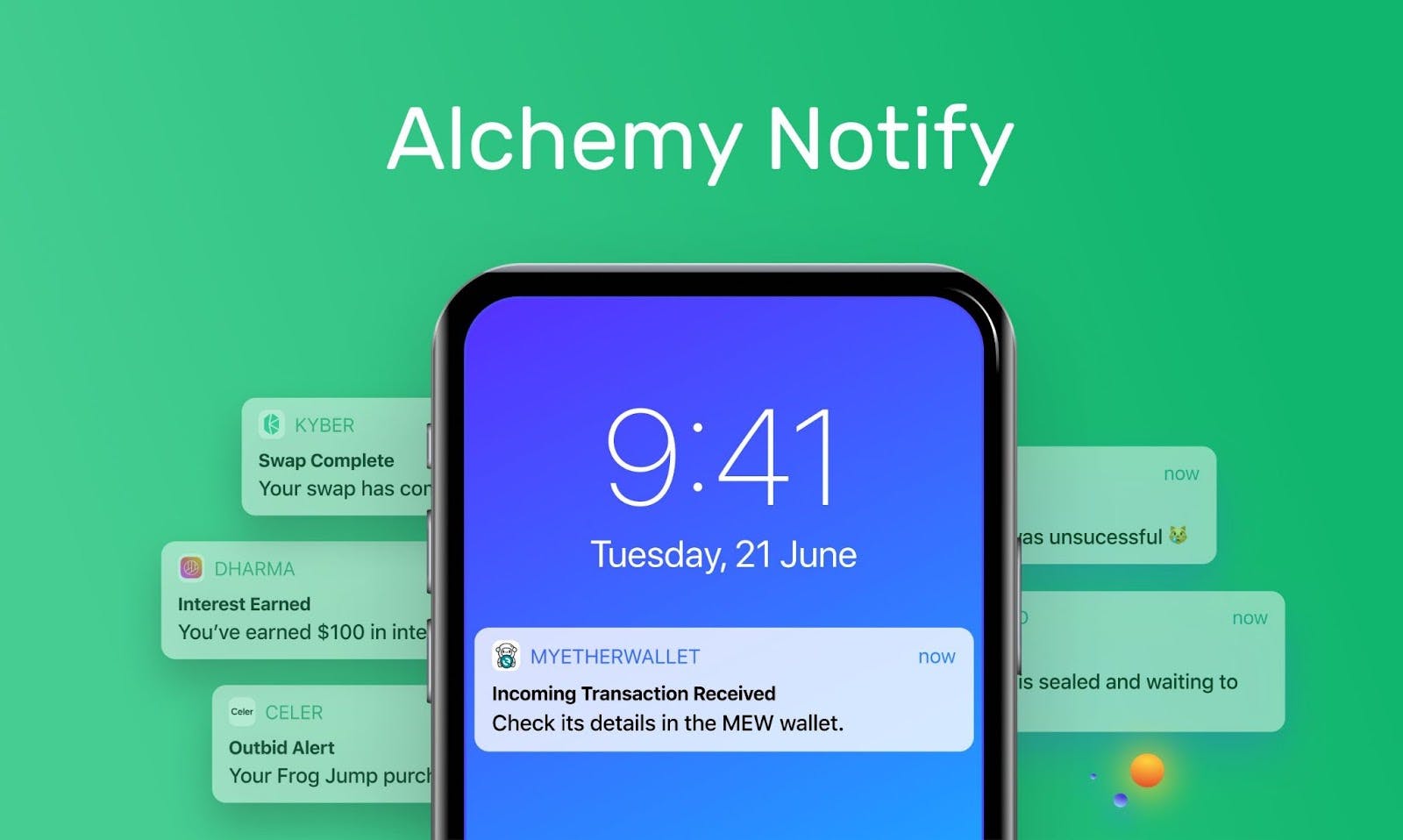
Security tools
If this year has revealed anything, it’s that security should be #1 priority for any blockchain project. Strengthening smart contract security is a bigger consideration than adding bells and whistles to your new dApp. For context, here are some of the biggest exploits this year:
Axie Infinity (hacked for $615 million)
Inverse Finance (hacked for $15 million)
Elephant Money (hacked for $11.2 million)
There are even more hacks, but these should give you the basic idea that smart contract security is serious business. Without the right security measures, you risk creating breeding grounds for malicious exploits, which can tank your reputation and discourage user adoption.
Octopus
First on our list of tools for beefing up smart contract security is Octopus, a solution for conducting a detailed analysis of smart contract code. Octopus offers symbolic execution, call flow analysis, and control flow analysis—all of which help you discover contract errors and fix them before it’s too late.
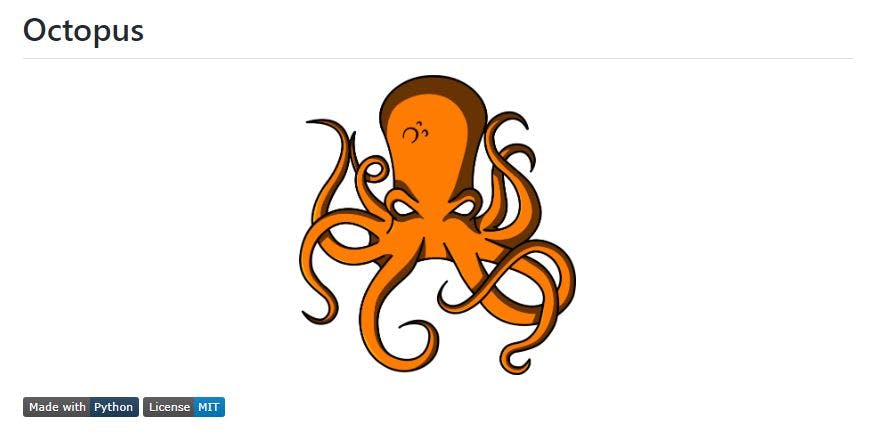
Mythril
Next up is Mythril, a ConsenSys-backed smart contract security tool. Mythril is useful for analyzing Ethereum Virtual Machine (EVM) bytecode and uses taint analysis, symbolic execution, and taint solving to identify bugs in Ethereum software.
Securify
To round up the list, we have Securify—a smart contract scanner supported by the Ethereum Foundation. Securify can detect up to 37 different software vulnerabilities and implements context-specific analysis for Solidity-based smart contracts.
Wallets
If you’re going to be building dApps, you’ll need a wallet to hold funds, even if it's test ether (ETH). To this end, you can set up a cryptocurrency wallet in minutes from your browser.
MetaMask
We recommend using MetaMask, as it provides additional functions than holding ETH. Available as a browser extension, MetaMask injects Web3js API to sites, which allows users to interact with dApps directly from their browser. MetaMask can also perform other functions like key management, reading blockchain data, and more.
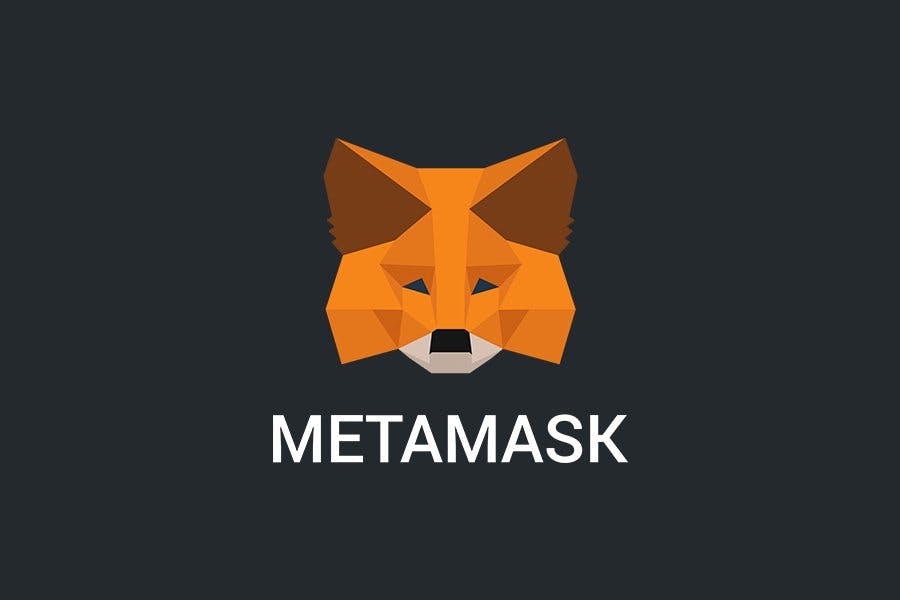
Final thoughts
Blockchain development can be an exciting journey, but only if you have the right tools to begin with. Creating a robust development stack makes it easier to create applications and improves the quality of your output.
This article has covered the top developer tools you need to start building blockchain applications, including frameworks, IDEs, security tools, test networks, blockchain oracles, and node services. To start building with these tools, open a developer account with Alchemy for free.

Related overviews
Explore popular programming languages for onchain apps.
Learn About the Challenges and Solutions Engineers Face for Monitoring Their Dapp's Health
This guide shares best practices on how to best prepare for launching your dapp

Build blockchain magic
Alchemy combines the most powerful web3 developer products and tools with resources, community and legendary support.